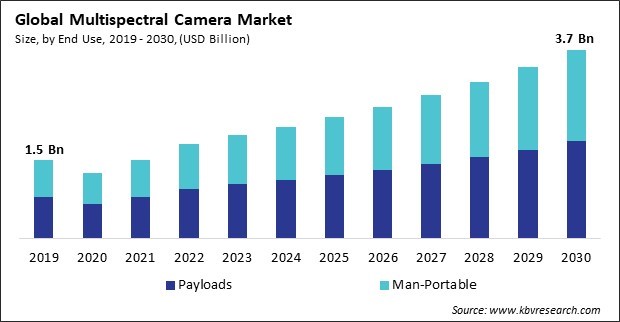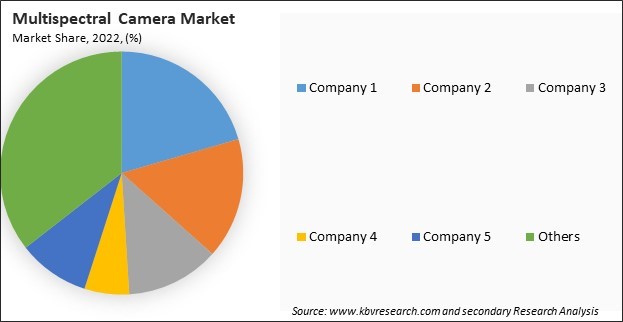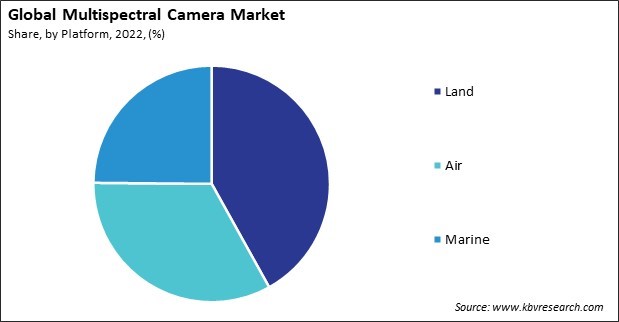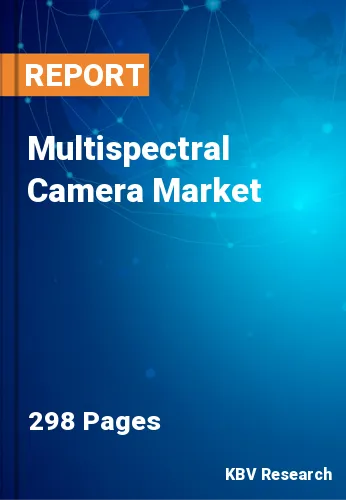“Global Multispectral Camera Market to reach a market value of USD 3.7 Billion by 2030 growing at a CAGR of 9.0%”
The Global Multispectral Camera Market size is expected to reach $3.7 billion by 2030, rising at a market growth of 9.0% CAGR during the forecast period.
The Asia Pacific region has a significant agricultural sector, and precision agriculture practices are gaining prominence. As a result, the Asia Pacific region is expected to achieve nearly 30% market share by 2030. As farmers adopt more technology-driven approaches, the demand for these cameras for precision farming applications has risen. Industries in Asia Pacific, including manufacturing, mining, and infrastructure development, incorporate these cameras for various applications.

Advances in sensor technologies, including developing more sensitive and efficient detectors, contribute to improved image quality and spectral sensitivity in these cameras. Moreover, ongoing research and development efforts focus on expanding the spectral bandwidth of these cameras. Therefore, ongoing technological advancements are driving the growth of the market. Additionally, these cameras can capture information beyond the visible spectrum, allowing for the differentiation of materials based on their spectral signatures. Furthermore, these cameras can assess the surface quality of materials by capturing information about surface characteristics that may not be visible in standard imaging. Hence, the rising adoption of this camera technology in the industrial sector propels the market's growth.
However, these cameras are complex devices with advanced imaging capabilities, leading to a high upfront capital investment for organizations looking to integrate them into their operations. Furthermore, organizations involved in environmental monitoring, such as government agencies or research institutions, may face budget constraints. Hence, the high initial cost of these cameras is hampering the market's growth.

The leading players in the market are competing with diverse innovative offerings to remain competitive in the market. The above illustration shows the percentage of revenue shared by some of the leading companies in the market. The leading players of the market are adopting various strategies in order to cater demand coming from the different industries. The key developmental strategies in the market are Acquisitions, and Partnerships & Collaborations.
On the basis of end use, the market is segmented into man-portable and payloads. In 2022, the man-portable segment attained a 47% revenue share in the market. Man-portable cameras are extensively used in military and special forces operations. These compact systems allow soldiers to capture multispectral imagery for situational awareness, surveillance, target identification, and threat detection in the field.
Based on platform, the market is divided into land, air, and marine. In 2022, the air segment procured 30% revenue share in the market. These cameras in the air contribute to environmental monitoring and research. They provide researchers and environmental scientists with valuable data for studying ecosystems, biodiversity, and environmental changes.

Based on imaging spectrum, the market is categorized into visible & near-infrared (VNIR), short-wave infrared (SWIR), mid-wave infrared (MWIR), and long-wave infrared (LWIR). In 2022, the visible/near-infrared (VNIR) segment registered 16% market share in the market. The visible/near-infrared (VNIR) spectral range is useful for vegetation analysis. These cameras operating in the VNIR range provide valuable information about agriculture's crop health, growth, and stress levels.
Based on cooling technology, the market is bifurcated into cooled and uncooled. The cooled segment attained a 25% revenue share in the market in 2022. Cooled cameras often exhibit higher sensitivity, especially in the infrared spectrum. The cooling mechanism reduces thermal noise, allowing for improved signal-to-noise ratios and enhanced sensitivity, which is crucial in applications requiring high precision and detection of faint signals.
By application, the market is divided into intelligence, surveillance & reconnaissance, target & tracking, navigation & guidance, and others. The target and tracking segment procured 27% revenue share in the market in 2022. These cameras provide better target discrimination by capturing data in different wavelengths. This capability helps differentiate between objects with similar visual appearances, reducing the likelihood of misidentification and improving the accuracy of target discrimination.
Free Valuable Insights: Global Multispectral Camera Market size to reach USD 3.7 Billion by 2030
Region-wise, the market is analyzed across North America, Europe, Asia Pacific, and LAMEA. The North America region generated a 30% revenue share in the market in 2022. North America has a highly developed agriculture sector, and precision agriculture practices are becoming increasingly prevalent. These cameras play a crucial role in precision farming applications, providing farmers with detailed insights into crop health, optimizing irrigation, and facilitating precision planting.
| Report Attribute | Details |
|---|---|
| Market size value in 2022 | USD 1.8 Billion |
| Market size forecast in 2030 | USD 3.7 Billion |
| Base Year | 2022 |
| Historical Period | 2019 to 2021 |
| Forecast Period | 2023 to 2030 |
| Revenue Growth Rate | CAGR of 9.0% from 2023 to 2030 |
| Number of Pages | 298 |
| Number of Tables | 530 |
| Report coverage | Market Trends, Revenue Estimation and Forecast, Segmentation Analysis, Regional and Country Breakdown, Market Share Analysis, Porter’s 5 Forces Analysis, Company Profiling, Companies Strategic Developments, SWOT Analysis, Winning Imperatives |
| Segments covered | Platform, Imaging Spectrum, Cooling Technology, Application, End Use, Region |
| Country scope |
|
| Companies Included | Teledyne Technologies, Inc. (Teledyne DALSA), Leonardo SpA (Leonardo DRS, Inc.), RTX Corporation, HENSOLDT AG, SILIOS Technologies, Exosens SAS, L3Harris Technologies, Inc., Kappa optronics GmbH (Afinum Management GmbH), Surface Optics Corporation and JAI A/S |
By End Use
By Platform
By Imaging Spectrum
By Cooling Technology
By Application
By Geography
This Market size is expected to reach $3.7 billion by 2030.
Ongoing advancements in technology are driving the Market in coming years, however, High initial cost of multispectral cameras restraints the growth of the Market.
Teledyne Technologies, Inc. (Teledyne DALSA), Leonardo SpA (Leonardo DRS, Inc.), RTX Corporation, HENSOLDT AG, SILIOS Technologies, Exosens SAS, L3Harris Technologies, Inc., Kappa optronics GmbH (Afinum Management GmbH), Surface Optics Corporation and JAI A/S
The expected CAGR of this Market is 9.0% from 2023 to 2030.
The Land segment generated the highest revenue in the Market by Platform in 2022; there by, achieving a market value of $1.5 billion by 2030.
The North America region dominated the Market by Region in 2022, and would continue to be a dominant market till 2030; there by, achieving a market value of $1.2 billion by 2030.
Our team of dedicated experts can provide you with attractive expansion opportunities for your business.

 Drivers
Drivers
 Restraints
Restraints
 Opportunities
Opportunities
 Challenges
Challenges
